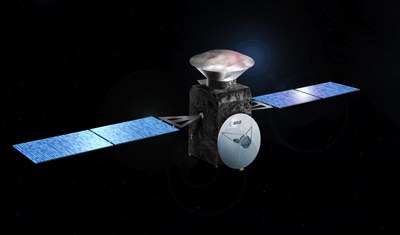Is OMB wiping out planetary exploration?by Lou Friedman
|
| Imagine a NASA that for ten years (say, 2015 to 2025) ceases to explore the solar system and stops looking deep into the universe. |
We’re in a similar situation today. Behind closed doors, the administration is deciding on NASA budget cuts that may not be in the best interest of either the agency or the American people. Having caved in to Congressional special interests on the Space Launch System (SLS), the administration is now prepared to sacrifice science and exploration programs in order to prematurely start its development, with requirements that will neither be met nor needed for more than a decade.
Imagine a NASA that for ten years (say, 2015 to 2025) ceases to explore the solar system and stops looking deep into the universe. Already, the administration has said that flagship missions to explore the outer planets will cease. Voyager, Galileo, and Cassini will be followed by nothing. Already, the administration has deeply cut the Mars program, reducing American plans to support a 2016 European mission and taking away funds that were to be used for a 2018 follow-on to Mars Science Laboratory, leading to Mars sample return.
Now, news reports and reliable sources are saying that the administration (in the form of OMB) may refuse to allow NASA to proceed with any joint Mars exploration plan with Europe. This decision would destroy the whole NASA/ESA Mars collaboration that has been built in the past several years. The collaborative plan was to have the US provide an Atlas launch of a European Trace Gas Orbiter mission (with several US instruments) in 2016, and then NASA and ESA would jointly develop a sophisticated astrobiology and sample cache rover mission in 2018. OMB seems to be cutting out the American role in the 2016 mission and refusing to let NASA commit to the 2018 collaboration. (ESA has sent a letter to NASA saying that ESA has committed about $1 billion to the joint NASA-ESA mission, but that financial commitment depends on the US formally committing to its role in the mission. We hear that OMB has refused, thus far, to let NASA respond positively).
The administration has also punted the James Webb Space Telescope. The current plan states that they will support JWST, but they do not specify either a budget or where the money will come from. Are they going to leave that to Congressional special interests too?
We are very much in danger of another dark decade with NASA funding going to new launchers that will have nothing much to launch and no results to show the American people. Sure, tough choices must be made given the financial state of the country, but, as I see it, if the choice is between continuing space exploration with the space telescope and with the search for life and habitability on Mars, or building a rocket to nowhere, it’s not a hard decision.
| This is not some humans-vs.-robots argument. Stopping robotic space exploration decreases the chances for human space exploration. |
To be clear: I am very much for both human space exploration and development of a deep space rocket (heavy lift or otherwise) to enable it. I am for it—but not at the expense of cutting out science and exploration. The rocket development, by NASA’s own (surely optimistic) schedule, will not lead to a mission until 2021. Can’t we postpone the rocket new start and then build it with a shorter development schedule (and hence lower cost)? It’s not as if we don’t have rockets or access to space: we have Atlas, Delta, Falcon, and, of course, Soyuz. We have even more rockets around the world for cargo and payloads. Our astronauts and cargo can get to the International Space Station for the rest of its life without the Space Launch System.
This is not some humans-vs.-robots argument. I am among the staunchest supporters for human explorers to go beyond the Moon and on to Mars as soon as possible. But for that to happen, NASA needs to do more than build a rocket over the next decade. Stopping robotic space exploration decreases the chances for human space exploration. If NASA’s Mars program is really devastated, as it now is on paper in OMB’s offices, then public support and interest in NASA doing space exploration in general will wither. It truly will become another federal jobs program.
Desperate times bring desperate reactions, and the ill-advised in-fighting going on among some—fortunately a small number—in the science community over Webb vs. Mars vs. astrophysics vs. solar physics vs. Earth science proves we are in desperate times. Rep. Frank Wolf, the chair of House Appropriations Committee subcommittee whose jurisdiction includes NASA, stoked the in-fighting fires by sending a letter to OMB Director Jacob Lew last month, asking the administration to tell the Congress how they recommend cutting the budget to pay for the increased costs of the James Webb Space Telescope. In tough budget times, such questions are not unfair; however, in this case, the behind-the-scenes maneuvering is being kept secret. The administration should respond directly to Rep. Wolf’s question by recommending delays in the Space Launch System (as President Obama originally proposed) until the fiscal conditions permitted a sustainable and cost-effective program. The money from the delay would pay for JWST, restore the Mars exploration program, including allowing the American role in 2016/2018 to proceed, and pay for a host of other science and technology initiatives.
If the administration will not make that recommendation, then Congress should, as I said last month, vote no on the Space Launch System.
